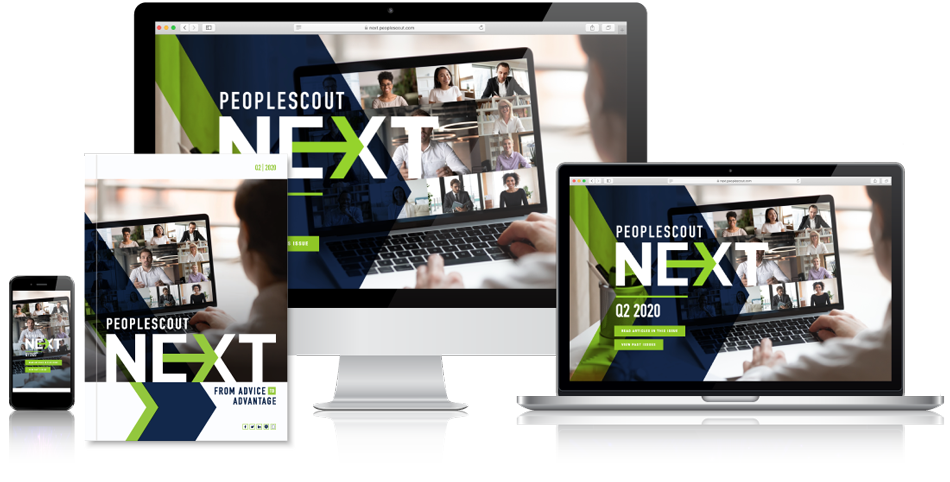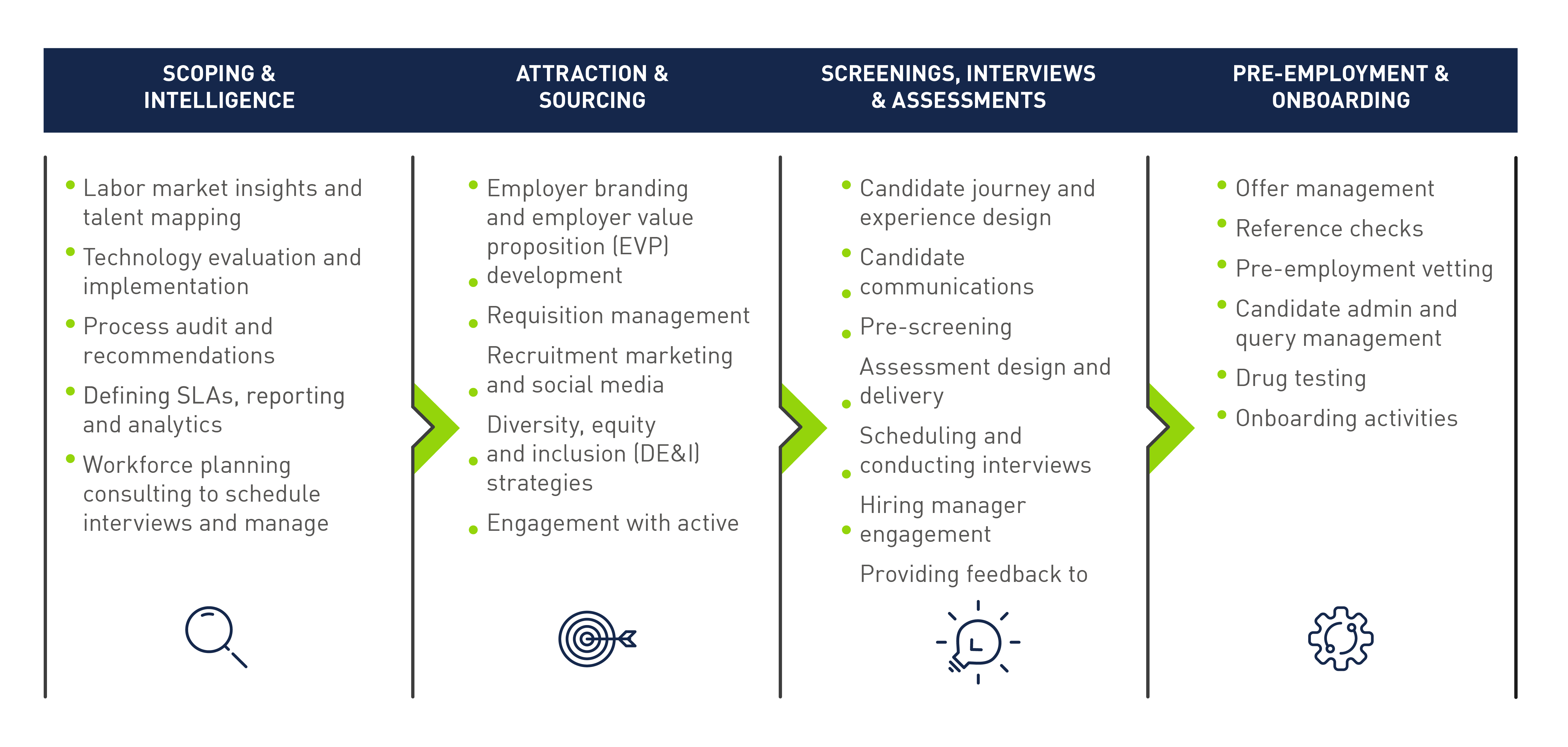PeopleScout
Coronavirus (COVID-19) Response
March 17, 2020 Update
At PeopleScout and the broader TrueBlue organization, the health and well-being of our employees and clients around the globe is our top priority. We are operating with an abundance of caution to keep our employees and clients safe during the fast-evolving coronavirus (COVID-19) outbreak. We also stand committed to supporting our clients and suppliers through this time.
The PeopleScout and TrueBlue crisis response team is monitoring the situation closely and adjusting our internal policies in alignment with global, country and local health organizations, including the World Health Organization (WHO), Centers for Disease Control and Prevention (CDC), Occupational Safety and Health Administration (OSHA), the U.S. Department of Labor and the National Safety Council.
Policy Approach: In setting policies and taking action related to the coronavirus, our intent is, at a minimum, to follow guidance from relevant authorities such as the WHO, CDC and OSHA. When additional or more extensive actions are prudent in light of the nature of our operations, we will do more than the standard guidance suggests to safeguard our employees.
Information Sharing: We have established a coronavirus information hub for our employees to make it easy for them to stay informed and protected with access to safety recommendations, frequently asked questions and links to useful resources. On the hub, employees can also submit individual questions and report risks to our crisis response team for immediate action. We also are producing a regular cadence of outbound communications and in-office communications to ensure that our employees are kept up to date on policy changes and critical developments.
Work From Home Policy: The vast majority of PeopleScout employees are equipped to work from home, which provides us with a great deal of flexibility when the situation calls for work site restrictions. Work from home protocols are part of our business continuity plans and have been implemented at our locations around the world and at client sites based on elevated risk, mandated social distancing measures and changes to client policies.
Healthy Work Environment: As part of our usual protocol, PeopleScout promotes a healthy work environment by encouraging sick employees to stay home and by providing office cleaning services and hygiene supplies such as hand sanitizers. As part of our coronavirus response, we have implemented enhanced environmental hygiene measures and are regularly sharing and reinforcing the measures recommended by the WHO, CDC, OSHA and other health authorities to help protect against coronavirus.
Travel Policy: We have temporarily suspended international travel and have restricted all non-critical domestic travel. Employees who have traveled to high-risk areas will be asked to work from home. Our goal is to reduce the risk that anyone at PeopleScout might contract or inadvertently spread the virus. These policy changes are important steps to help minimize the spread of coronavirus. We will continue to monitor the situation and adjust this policy as additional information becomes available from world health authorities.
Self-Quarantine Procedure: All employees and contractors who have traveled (or whose household members/those with whom they have close or frequent contact have traveled) to, or transited through, any high-risk area, or who have been in close contact with someone who has tested positive for COVID-19 are required to complete a 14-day waiting period at home before returning to an office or client site. The timeline begins the date the individual undergoing the waiting period or household member returned to their home country or when they came into contact with the infected individual.
Business Continuity: PeopleScout has well-planned and documented capabilities for continuing to provide world-class service to our clients no matter what challenges we may experience in our work environments. This includes crisis-management, emergency response and business continuity plans, as well as client-specific protocols. Our scalable global delivery centers and virtual teams provide a great deal of flexibility about where work is performed, and our client-specific plans take into account our work sites as well as our clients. As part of our response to the coronavirus outbreak, we are currently conducting exercises to ensure our readiness to implement regional business continuity plans and client-specific protocols and that our employees are well-informed and prepared.
Supply Management: We have implemented rapid-reporting cycles to enable us to quickly identify potential candidate or worker availability shortages and are implementing plans to increase candidate benches for in-demand worker types. We are ready to work with our clients to redirect recruiting or staffing efforts to different facilities or regions as well as to examine current talent acquisition processes to find ways to make them more virtual through our technology platform.
MSP Supplier Management: PeopleScout’s MSP supplier management team is sharing the steps that PeopleScout is taking to promote a healthy work environment with our MSP supplier network and asking them to follow the WHO, CDC and OSHA recommendations. Suppliers are being instructed to engage with clients on local facility business continuity plans, to bring questions to our team for triaging and to notify us immediately of any concerns. We are also communicating regularly with our suppliers to ensure that we have as much advance warning as possible about issues that could disrupt supply and are proactively evaluating our supply base to ensure that we have adequate coverage in high-risk areas and high-demand skill types.
Virtual TA Solutions: We are offering virtual interview solutions to support clients who have enacted no-contact hiring. We are also are ready with recruiter on-demand solutions and can support contingent staffing needs through our MSP practice and our PeopleReady staffing brand.
Client Resource Center: We have developed a client resource center to provide up-to-date information on PeopleScout’s response to COVID-19 and useful information for managing through these uncertain times.
PeopleScout is committed to supporting our clients’ current needs and emerging needs through the coronavirus outbreak. First and foremost, our commitment is to continue to deliver excellent service while communicating transparently. That begins with regular sharing of our response to coronavirus and continues with ongoing communication about how coronavirus is impacting the markets in which we operate and sharing any specific threats to supply.
Additionally, many organizations have already experienced significant impact to business demand and operations. We are seeing a meaningful shift in client talent needs; demand is down in some markets and peaking in others, and we are receiving requests for workers to help safeguard employees and clients and reinforce response efforts. At PeopleScout and TrueBlue, we are committed to nimbly supporting our clients through this situation.
Whether our clients need to scale up their workforce, tap into new talent pools or find high-quality contract workers, we stand ready to support them. PeopleScout has proactively engaged in resource management and training for key talent sectors, including both on-demand recruitment support and contingent labor pools. We are experts in quickly identifying and placing talent and can help our clients deliver on their organization’s response team recommendations. We can also help guide their business continuity plans, sourcing workers from geographically dispersed talent pools or pulling together spot teams to maximize operational readiness to ensure minimal distribution and service disruptions.
If our client’s organization is on the front lines providing critical care to those affected, or their business will be impacted by the global response, our goal is to help them fulfill their organization’s commitments to their employees and customers.




